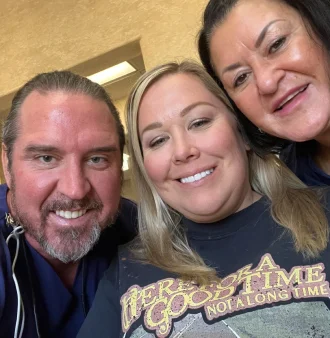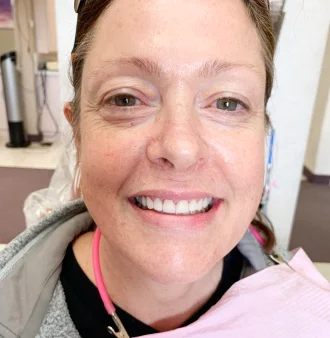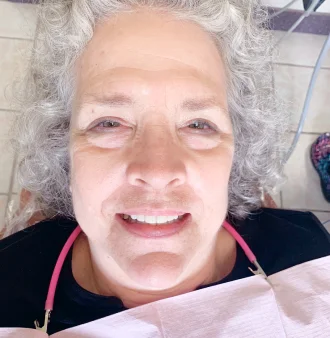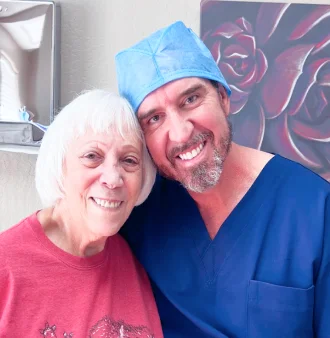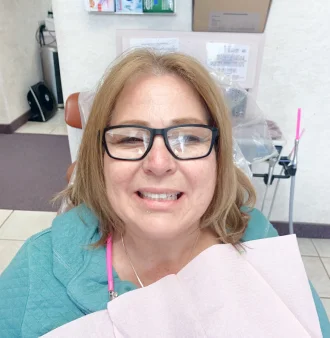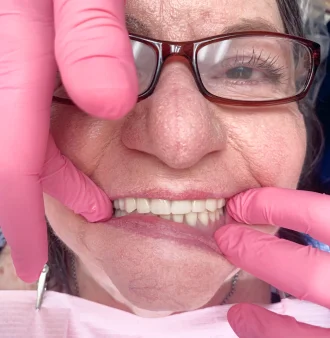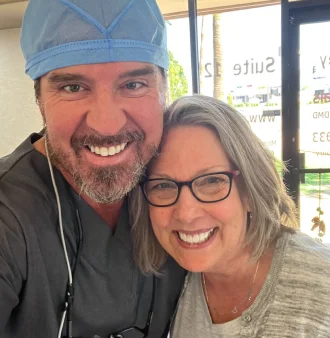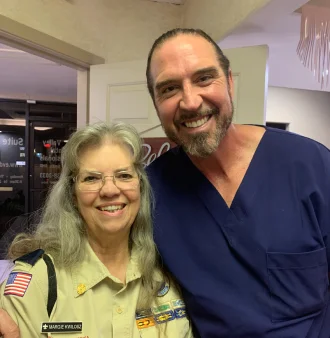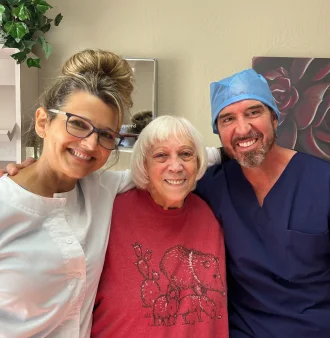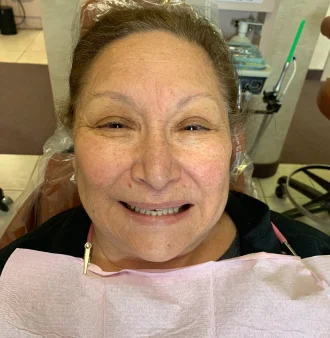Dental Bonding in Mesa AZ
Dental bonding is usually used as a restorative procedure for chipped teeth, cracked teeth, discolored teeth or disarranged teeth.
EVDP dentistry is experienced with dental bonding procedures and has garnered expertise over the years. We will provide you with top-notch customer service and a professional consultation to ensure that you are comfortable with the process. If you are interested in dental bonding in Mesa AZ, give us a call today!
Benefits
- Cost-Effective: Bonding is one of the most affordable cosmetic dental treatments available.
- Minimally Invasive: The procedure typically requires little to no removal of enamel and can often be completed without anesthesia.
- Quick Procedure: Most dental bonding treatments can be completed in a single visit, often in an hour or less per tooth.
- Improves Tooth Appearance: Bonding can repair chipped, cracked, discolored, or misshapen teeth, enhancing your smile aesthetically.
- Reduces Tooth Gaps: It can be used to fill in small gaps between teeth, creating a more even, cohesive look.
- Protects Exposed Roots: Dental bonding can cover exposed roots that can occur with gum recession, protecting them from decay and reducing sensitivity.
What people say
about Us
I've been a patient for fifteen years and I couldn't imagine going elsewhere. Everyone is professional, kind and the best of the best! I've had most every oral procedure and each has been flawless.
They are always friendly, attentive, have quick service and respond quickly to questions.
EVDP is amazing, the patient care is top notch and they do beautiful work! I felt so taken care of as patient and strongly recommend their services!
The visit was great I hope I can come up with the money some he can fix my mouth for me. At 53 have never had a kinder Dr. in my mouth. Wish I had insurance so he could do my work today.
Everyone was helpful and kind. I appreciate the introductions of who people were. My stay was pleasant and I'm hopeful my tooth problem is resolved.
Dental bonding is used as a restorative procedure for chipped, cracked, discolored and disarranged teeth.
EVDP is experienced with dental bonding procedures and has garnered expertise over the years. We will provide you with top-notch customer service and a professional consultation to ensure that you are comfortable with the process. If you are interested in dental bonding in Mesa, give us a call today!
What Can Dental Bonding Do For You?
Dental bonding is used when a dentist applies a tooth-colored composite resin to repair a chipped, decayed, or fractured tooth. Bonding is used to cover a tooth and can change the shape and appearance as well as improve the health of a damaged tooth or root. Dental bonding is a cosmetic procedure that is affordable and easily accomplished in a single office visit. If you are interested in dental bonding, get in touch with our office.
Benefits of Dental Bonding
Dental bonding is easy, efficient, and affordable. The cosmetic dental procedure focuses on binding composite resin and shaping it to adapt and match the surrounding teeth. It is often used for aesthetic purposes to improve the appearance of chipped or discolored teeth. It can also help close gaps between your teeth and change their size and shape as well.
The most important medical benefit of dental bonding is that it can protect a tooth root that has become exposed due to gum disease. Dental bonding plays an important role in repairing decayed teeth because it also fills cavities. It is a great cosmetic alternative to amalgam fillings, which are silver in color making them very visible. Whereas, dental bonding is designed to blend in with the color of your natural teeth.
The Procedure
When you come in for your initial consultation, your dentist will select a resin color that will best match your tooth. Once your dentist has chosen a color, they will fix the surface of the tooth to increase its rough texture. The tooth will be coated with a quality conditioning liquid.
Once your tooth is prepared, your dentist will apply the resin. They will mold and smooth it out, so it forms the proper shape. The material will harden under a UV light. Once the bonding material hardens, your dentist can trim and shape the surface. They will also polish the material until it matches the rest of the surface.
The whole process will take 30 minutes to an hour. It’s a very convenient and fast procedure. Keep in mind that coffee, tea, red wine, and cigarettes can stain the resin material. It’s best to avoid them for the first 48 hours after the procedure. You should also brush your teeth often and visit your dental hygienist on a regular basis.
Will The Material Match My Existing Teeth?
Our dental professionals will take the time needed to match the resin material to the color of your existing teeth so that your bonding matches seamlessly. It is important to consider whitening procedures prior to your dental bonding. If you were to have the bonding procedure first and then undergo teeth whitening, your bonding would not whiten the way that your natural teeth would. This would create a stark contrast in the color of your natural teeth and bonded teeth.
This means that you should discuss your interest in any whitening procedures with our team prior to your dental bonding procedure. We highly recommend whitening your teeth first so that we can accurately match the resin material used in the bonding to your newly, whitened teeth.
Who Qualifies for Bonding?
The next step is finding out if you qualify for dental bonding. Usually, you are eligible for tooth bonding if you need additional coverage or tissue to obtain the perfect smile. It’s best to ensure that you have healthy teeth before beginning the bonding procedure.
For example, if you have severe tooth decay or cavities, it’s best to have these issues taken care of before beginning the dental bonding process. These procedures are often used to help close gaps or triangles between your teeth, fix minor chips, shape your teeth, or change the length of a tooth. Whatever the situation, it’s best to have a consultation with a dentist before proceeding with the procedure.
Risks and Disadvantages
Although dental bonding can shape and fix your teeth, there are some risks that you should take into consideration. Since the composite resin is not as durable as your natural teeth, biting your fingernails or chewing on hard materials can chip the resin. If you chip your bonding, you will need to visit our office for repairs as soon as possible. Bonding often lasts several years before it needs to be repaired or replaced.
Dental bonding can also stain over time so if you are a heavy coffee or wine drinker or a smoker, this may not be the best procedure for you. The staining of your bonded teeth over time can make your bonding stand out from the rest of your teeth.
Bonding also does not have the best longevity when compared to other dental solutions such as veneers. Dental bonding typically lasts around three to seven years depending on how well you care for your teeth. How long the bonding will last depends on how much bonding was done and on your dental health.
If you routinely brush your teeth twice a day, floss, and use mouthwash on a daily basis, your dental bonding will last for a longer period of time. Unfortunately, if you have a habit of skipping your dental hygiene routine, your dental bonding may need to be replaced more frequently.
The Cost
Dental bonding costs average between $300 and $600 per tooth. The overall cost will depend on how much bonding is needed, if any other dental issues need to be addressed prior and your dental insurance. Some insurance companies may cover a portion of your costs depending on the reason for the bonding and your insurance coverage.
If your dental bonding is considered a cosmetic procedure, most insurance companies will decline to provide coverage; whereas if the procedure is deemed medically necessary, you may be able to use your insurance coverage.
How to Decide If Dental Bonding Is Right for You
Dental bonding can help improve your smile. If you are interested in the procedure, it’s best to talk to our dentist. We can provide you with the proper consultation to see if you qualify. Our dental team will assess your current oral health, bone density and needs. We will then review all your possible treatment options and help you select the best path to achieve your goals. If your priorities are a quick, affordable solution and your health supports it, bonding may be the best solution.
Once you decide to move forward with dental bonding, you can schedule an appointment to begin the procedure. The procedure takes 30 to 60 minutes so it’s typically fast and convenient, and can be completed in one office visit. After the procedure, it’s best to make sure that you practice excellent dental hygiene on a daily basis and chew your food carefully. Since the resin materials are very delicate, they can break easily.
To ensure that you have a great dental bonding experience, it’s best to have the procedure done by a dental clinic with years of experience and expertise. We put our best foot forward for every patient that walks through our door. We are invested in helping you achieve the smile you have always wanted and to make it a pleasant and comfortable experience. If you are considering dental bonding in Mesa, AZ, contact us today!
Your Smile's Happy Place! Come visit us and see why
Fun atmosphere, friendly staff, and zero dentist nightmares

